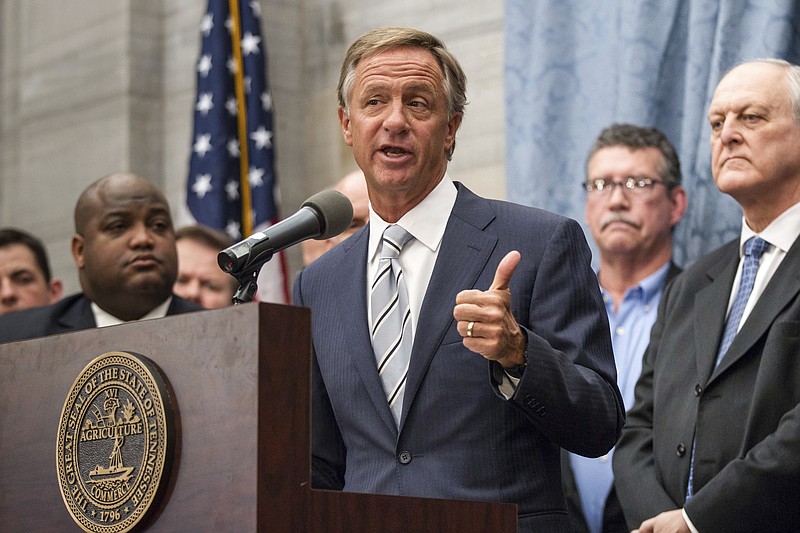NASHVILLE - When he delivers his final State of the State address Monday, Gov. Bill Haslam is expected to reflect on Tennessee's strides in areas such as education and job growth during his tenure while looking ahead to new initiatives like his $30 million plan to combat the state's opioid epidemic as well as helping more students complete college.
This is the term-limited Republican's eighth and last address, an annual public rite in which governors set forth their priorities before a televised joint convention of the General Assembly.
In just under a year from now, Haslam will be out of office after having governed with the help of a Republican-controlled Legislature, the first time that's happened since Tennessee's post-Civil War Reconstruction days.
Haslam will address the state House and Senate at 7 p.m. The event will be streamed online.
As he put the final touches on his speech last week, Haslam's press secretary, Jennifer Donnals, said the governor is "reflecting on how far Tennessee has come in the past seven years, especially the number of jobs created, incredible gains in K-12 and higher education, and a commitment to conservative fiscal policies that have led to more than $500 million in tax cuts.
"But," Donnals added, "he knows the work is not done."
Last week, Haslam announced his TN Together plan "to end the opioid crisis in our state," Donnals said, "and on Monday you can expect him to announce an initiative to help more students complete college and be prepared to enter the workforce with degrees or certificates."
There's also legislation "that will positively impact the lives of children who enter the juvenile justice system and their communities," Donnals said.
Both the opioid and juvenile justice issues have had input from legislators. A House panel under the direction of House Speaker Beth Harwell, R-Nashville, took a deep dive into Tennessee's narcotic pain-killer crisis. Haslam, meanwhile, convened a task force of his own, as well as borrowing some elements of the House's effort. His plan focuses on prevention, education and treatment.
It's already been criticized by legislative Democrats as not doing nearly enough to fight a scourge that's resulted in at least 4,500 overdose deaths since 2011.
Meanwhile, a joint juvenile justice task force put together by Haslam, Senate Speaker Randy McNally, R-Oak Ridge, Harwell and Tennessee Supreme Court Chief Justice Jeff Bivins, meanwhile, is recommending the state devote resources to the state's highest-risk youth while providing earlier government responses to youths just beginning to have problems.
Harwell and McNally, who is the state's lieutenant governor, noted that the well-spring for much of Haslam's policies will come from his proposed Fiscal Year 2018-2019 budget, the state's annual spending plan. That will be released Monday as well.
It will be a "big part of what he does" in the State of the State speech, said McNally, a former Senate Finance Committee chairman.
The current budget is estimated at $37.3 billion, with $17.9 billion of that in general state government money, $13.6 billion from the federal goverment and $5.8 billion in other sources such as higher education student tuition and fees.
Things are going pretty well on the budget front. Year-to-date revenues for the first five months of FY 2018 ran $210.2 mil- lion more than budgeted estimates, with $172.7 million of that in the general fund which pays for programs ranging from K-12 education to operating prisons.
McNally said he expects Haslam will outline program improvements and economic incentives to recruit new businesses and encourage existing ones to expand. The speaker thought the governor might also discuss his plans to trim the University of Tennessee system's Board of Trustees from 27 to nine members.
"If not, those bills will probably be ready and introduced shortly," McNally said.
Haslam argues the board is too large and will have better focus if reduced.
One thing lawmakers won't have hanging over them in this year's speech is a major push for new taxes. Last year, the governor pushed through his IMPROVE Act. It hiked gas and diesel taxes for roads for the first time in nearly 30 years while simultaneously cutting some corporate taxes, as well as reducing the sales tax on grocery food from 5 percent to 4 percent.
That split Republicans in the House, with the bill passing the lower chamber only with an assist from Democrats. Most Senate Republicans backed the program.
But this year, Democrats are already taking shots at Haslam's plan to address the state's opioid crisis, saying it simply doesn't do enough, because there's not enough funding for treatment.
They say the governor should again seek to expand Medicaid, operated here as TennCare, to help provide a new source of dollars for treatment. Medicaid expansion was a cause Haslam championed in 2011 as he began his second term, only to have his effort to extend TennCare to some 280,000 working adults under the federal Affordable Care Act shot down not once but twice by fellow Republicans in a Senate committee.
While some GOP-led states are now eyeing "ObamaCare" expansions after congressional Republicans' promise to repeal the law flopped, Haslam is showing no appetite for reprising his painful Medicaid expansion quest.
Last week, Senate Democratic Caucus Chairman Jeff Yarbro of Nashville called the governor's opioid proposal a "standard-issue, incremental plan." House Democratic Caucus Chairman Mike Stewart, meanwhile, said Haslam is in effect "hamstrung" by his own "Republican super majority" in the House and Senate.
The plan is also drawing concerns from physicians and some lawmakers over a provision seeking to limit pain-killer prescriptions for new patients to five days except in cases of cancer, end-of-life hospice care and a few other areas.
"We don't want to oppose coverage for people with legal needs," said Rep. JoAnne Favors, D-Chattanooga, a retired nurse and health facilities administrator.
Contact Andy Sher at asher@timesfreepress.com or 615-255-0550. Follow him on Twitter @AndySher1.
